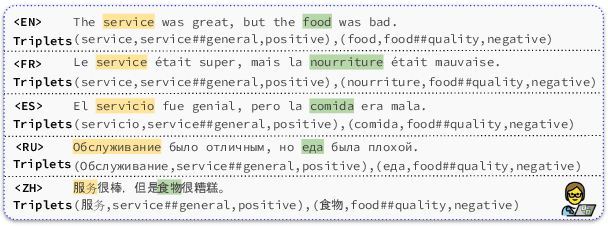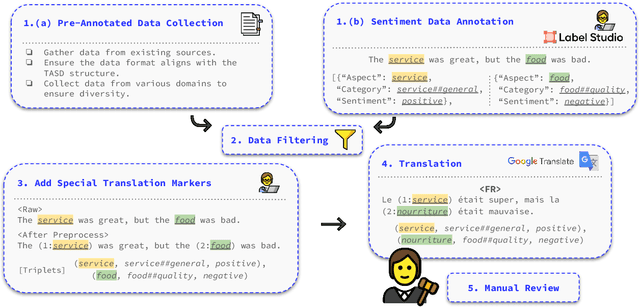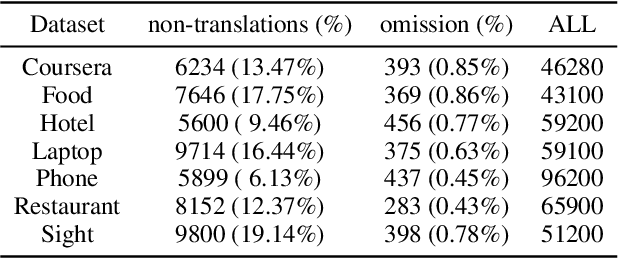Chengyan Wu
From Detection to Mitigation: Addressing Gender Bias in Chinese Texts via Efficient Tuning and Voting-Based Rebalancing
Sep 09, 2025Abstract:This paper presents our team's solution to Shared Task 7 of NLPCC-2025, which focuses on sentence-level gender bias detection and mitigation in Chinese. The task aims to promote fairness and controllability in natural language generation by automatically detecting, classifying, and mitigating gender bias. To address this challenge, we adopt a fine-tuning approach based on large language models (LLMs), efficiently adapt to the bias detection task via Low-Rank Adaptation (LoRA). In terms of data processing, we construct a more balanced training set to alleviate class imbalance and introduce heterogeneous samples from multiple sources to enhance model generalization. For the detection and classification sub-tasks, we employ a majority voting strategy that integrates outputs from multiple expert models to boost performance. Additionally, to improve bias generation detection and mitigation, we design a multi-temperature sampling mechanism to capture potential variations in bias expression styles. Experimental results demonstrate the effectiveness of our approach in bias detection, classification, and mitigation. Our method ultimately achieves an average score of 47.90%, ranking fourth in the shared task.
Multimodal Emotion Recognition in Conversations: A Survey of Methods, Trends, Challenges and Prospects
May 26, 2025Abstract:While text-based emotion recognition methods have achieved notable success, real-world dialogue systems often demand a more nuanced emotional understanding than any single modality can offer. Multimodal Emotion Recognition in Conversations (MERC) has thus emerged as a crucial direction for enhancing the naturalness and emotional understanding of human-computer interaction. Its goal is to accurately recognize emotions by integrating information from various modalities such as text, speech, and visual signals. This survey offers a systematic overview of MERC, including its motivations, core tasks, representative methods, and evaluation strategies. We further examine recent trends, highlight key challenges, and outline future directions. As interest in emotionally intelligent systems grows, this survey provides timely guidance for advancing MERC research.
Multi-Scale and Multi-Objective Optimization for Cross-Lingual Aspect-Based Sentiment Analysis
Feb 19, 2025Abstract:Aspect-based sentiment analysis (ABSA) is a sequence labeling task that has garnered growing research interest in multilingual contexts. However, recent studies lack more robust feature alignment and finer aspect-level alignment. In this paper, we propose a novel framework, Multi-Scale and Multi-Objective optimization (MSMO) for cross-lingual ABSA. During multi-scale alignment, we achieve cross-lingual sentence-level and aspect-level alignment, aligning features of aspect terms in different contextual environments. Specifically, we introduce code-switched bilingual sentences into the language discriminator and consistency training modules to enhance the model's robustness. During multi-objective optimization, we design two optimization objectives: supervised training and consistency training, aiming to enhance cross-lingual semantic alignment. To further improve model performance, we incorporate distilled knowledge of the target language into the model. Results show that MSMO significantly enhances cross-lingual ABSA by achieving state-of-the-art performance across multiple languages and models.
M-ABSA: A Multilingual Dataset for Aspect-Based Sentiment Analysis
Feb 17, 2025



Abstract:Aspect-based sentiment analysis (ABSA) is a crucial task in information extraction and sentiment analysis, aiming to identify aspects with associated sentiment elements in text. However, existing ABSA datasets are predominantly English-centric, limiting the scope for multilingual evaluation and research. To bridge this gap, we present M-ABSA, a comprehensive dataset spanning 7 domains and 21 languages, making it the most extensive multilingual parallel dataset for ABSA to date. Our primary focus is on triplet extraction, which involves identifying aspect terms, aspect categories, and sentiment polarities. The dataset is constructed through an automatic translation process with human review to ensure quality. We perform extensive experiments using various baselines to assess performance and compatibility on M-ABSA. Our empirical findings highlight that the dataset enables diverse evaluation tasks, such as multilingual and multi-domain transfer learning, and large language model evaluation, underscoring its inclusivity and its potential to drive advancements in multilingual ABSA research.
Evaluating Zero-Shot Multilingual Aspect-Based Sentiment Analysis with Large Language Models
Dec 17, 2024



Abstract:Aspect-based sentiment analysis (ABSA), a sequence labeling task, has attracted increasing attention in multilingual contexts. While previous research has focused largely on fine-tuning or training models specifically for ABSA, we evaluate large language models (LLMs) under zero-shot conditions to explore their potential to tackle this challenge with minimal task-specific adaptation. We conduct a comprehensive empirical evaluation of a series of LLMs on multilingual ABSA tasks, investigating various prompting strategies, including vanilla zero-shot, chain-of-thought (CoT), self-improvement, self-debate, and self-consistency, across nine different models. Results indicate that while LLMs show promise in handling multilingual ABSA, they generally fall short of fine-tuned, task-specific models. Notably, simpler zero-shot prompts often outperform more complex strategies, especially in high-resource languages like English. These findings underscore the need for further refinement of LLM-based approaches to effectively address ABSA task across diverse languages.
 Add to Chrome
Add to Chrome Add to Firefox
Add to Firefox Add to Edge
Add to Edge